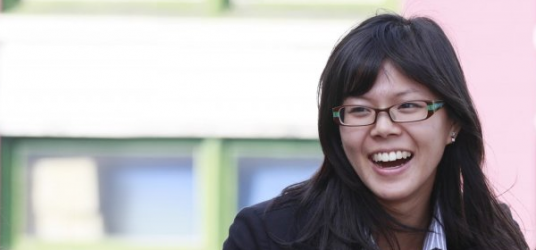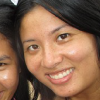
Christina Wu finished a joint major in Business and Communication at SFU and is now working as a Communications Coordinator for the BC Council for International Education. As we go deeper into her story, she experienced continuous personal and professional growth by completing four Co-op terms, going on exchange in Denmark for a semester and doing lots of volunteer work.
Christina shared her rich experiences and how Co-op played a significant part in developing the skills and connections she has today. She completed her Co-op terms at Grey Group Canada as a Warner Bros. Intern (2005) and BC Transmission Corporation (currently BC Hydro) in a Communications Co-op position.
Her former colleagues not only helped her learn the skills she needed for the job, but also supported her with the communications work she was doing for the non-profit she was involved in called Global Agents for Change, whose mission is to find lasting solutions to poverty.
Why did you join Co-op and what year did you begin the program?
I joined Co-op to gain work experience and soon realized it was more about helping me figure out what kind of work environments and activities I enjoyed and excelled at.
What were some of the most valuable skills and lessons you took from the places you worked at during your Co-op work terms?
I would say the number one skill I got and directly applied after graduation was the ability as a communicator to translate technical, industry specific jargon into common language understood by a wider public audience. In an academic environment, something like this is challenging to teach. Other valuable skills I learned were multi-tasking, media monitoring, and generally the ability to build relationships with people outside an organization, such as sponsors and contractors.
While I was at the BC Transmission Corporation (currently BC Hydro), my colleagues were really nice and taught me how to write press releases for the non-profit I was involved in at the time. I didn’t have much experience at the time doing media relations. But they took the time to share their extensive experience in the industry with me. After that, I was able to write press releases in my sleep and get some good media coverage for our events.
Why did you volunteer when you were in university?
Coming from a small high school, I volunteered to meet more of my fellow classmates and to find a sense of community, especially as SFU has a reputation of being a commuter university. I started out by co-founding BAM (Business Administration Merchandise), Beedie School of Business' first line of branded merchandise, since my classmates and I realized nothing existed. I moved on to co-chair the VP Communications position at the BASS (Business Administration Student Society).
After this, I started to look beyond the SFU borders, and searched for ways to impact the wider global community. I was interested in issues of social change and what I could do as a business student, so I went on to co-found a local registered charity Global Agents which harnesses a global network of leaders who create solutions to poverty.
How does volunteering and/or exchange help with Co-op?
Volunteering allowed me to adapt to working in a team setting, and many of the skills I gained were definitely transferable to my Co-op positions. With going on exchange, I was faced with different working cultures and approaches as my classmates were from countries all over the world. This gave me the ability to move comfortably between different workplace cultures.
How did your Co-op coordinators help you find jobs?
They helped me build a strong and concise resume and cover letter and prepare for the interview process. They gave me the confidence and tips to make that transition from a student to an employee in a workplace.
It's been a few years since you finished your last Co-op, how did your Co-op experience help you get to where you are today?
Without realizing it, volunteering helped me build my professional and personal network. Many of the people I work with are now close friends and advisors, and some even became fellow colleagues in my life after graduation. All the skills I've learned from Co-op I now directly apply to my work today. Co-op helped me build my portfolio of work samples, which was extremely useful in the interview process after graduation.
What advice do you have for current Co-op students to be successful in the program?
Don't be discouraged by the interview process! It's something you become more comfortable with each time you go to another interview. Don't undervalue or undersell yourself as a student. You have many valuable skills so be proud of what you've achieved. As difficult as it sometimes is, put yourself out there in an interview and in your resume by highlighting the things you've accomplished.
Christina continues to be involved with Global Agents for Change as a Board of Director and a key member at Education Generation, their partner organization.














